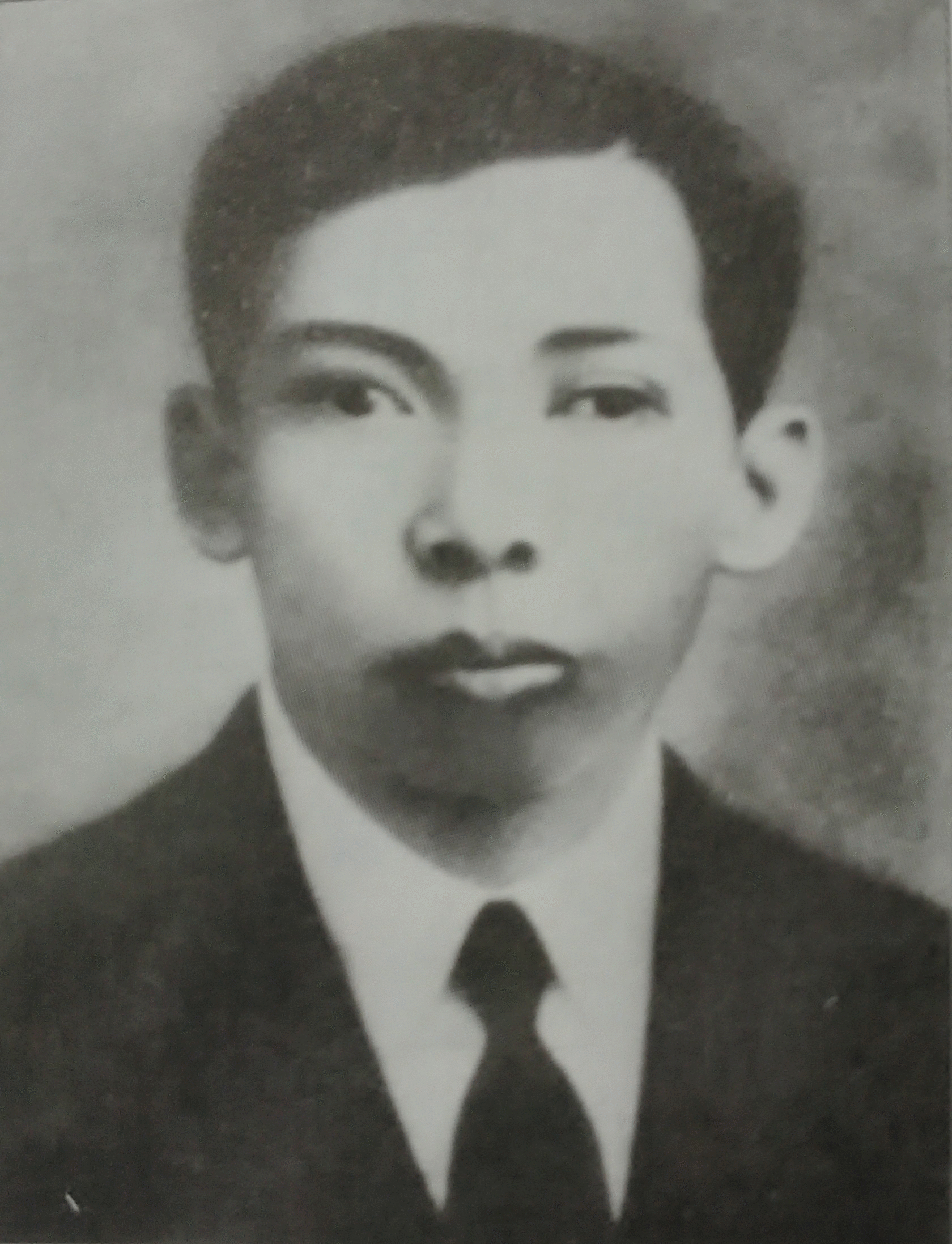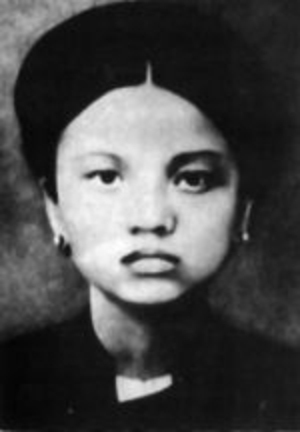|
Nguyễn Văn Cừ (revolutionary)
Nguyễn Văn Cừ (9 July 1912 – 28 August 1941) was a Vietnamese revolutionary, a descendant of Nguyễn Trãi. He served as the fourth General Secretary of the Central Committee of the Communist Party of Vietnam (CPV) 30 March 1938 – 9 November 1940. Nguyễn Văn Cừ was arrested by the French and executed by French firing squad at the Giồng T-road junction (ngã ba Giồng) in Hóc Môn District along with Nguyễn Thị Minh Khai and Võ Văn Tần Võ Văn Tần (21 August 1894 – 28 August 1941) was a Vietnamese revolutionary. He was executed by French firing squad at the Giồng T-road junction (ngã ba Giồng) in Hóc Môn District along with Nguyễn Thị Minh Khai Nguyễn Thị ... in August 1941.Erik Harms Saigon's Edge: On the Margins of Ho Chi Minh City - Page 29 "... intersection, where many anticolonial figures perished, including, most famously, the trio of Nguyễn thị Minh Khai, Võ Văn Tần, and Nguyễn Văn Cừ, who were put before the ... [...More Info...] [...Related Items...] OR: [Wikipedia] [Google] [Baidu] |
General Secretary Of The Communist Party Of Vietnam
The General Secretary of the Central Committee of the Communist Party of Vietnam ( vi, Tổng Bí thư Ban Chấp hành Trung ương Đảng Cộng sản Việt Nam), known as First Secretary ( vi, Bí thư Thứ nhất) from 1960 to 1976, is the highest office within the Communist Party of Vietnam and typically the supreme leader of Vietnam. The General Secretaryship was the second-highest office within the party when Hồ Chí Minh was Chairman, a post which existed from 1951 to 1969. The general secretary is also the Secretary of the Central Military Commission, the leading Party organ on military affairs. For a period in its history, the position of general secretary has been synonymous with the paramount leader of Vietnam. The current general secretary is Nguyễn Phú Trọng, and he is ranked first in the Politburo. Trần Phú, one of the founding members of the Indochinese Communist Party, was the party's first general secretary. A year after being elected, he was ... [...More Info...] [...Related Items...] OR: [Wikipedia] [Google] [Baidu] |
Central Committee Of The Communist Party Of Vietnam
The Central Committee of the Communist Party of Vietnam (Vietnamese: ''Ban Chấp hành Trung ương Đảng Cộng sản Việt Nam'') is the highest decision-making body of the party between convocations of the National Congress. History The Central Committee was established on 3 February 1930 when the Communist Party of Indochina and the Communist Party of Annam merged. In between Central Committee plenary sessions the main decision-making bodies of the party are the Politburo and the Secretariat. The Central Committee has been led since its establishment in 1930 by the General Secretary of the Central Committee. Terms See also * Central Committee subunits ** Politburo of the Communist Party of Vietnam ** Secretariat of the Communist Party of Vietnam ** General Secretary of the Communist Party of Vietnam * List of central officeholders in the Communist Party of Vietnam List of important leaders of the Communist Party of Vietnam and the Socialist Republic of Vietnam 19 ... [...More Info...] [...Related Items...] OR: [Wikipedia] [Google] [Baidu] |
Communist Party Of Vietnam
The Communist Party of Vietnam (CPV), also known as the Vietnamese Communist Party (VCP), is the founding and sole legal party of the Socialist Republic of Vietnam. Founded in 1930 by Hồ Chí Minh, the CPV became the ruling party of North Vietnam in 1954 and then all of Vietnam after the collapse of the South Vietnamese government following the Fall of Saigon in 1975. Although it nominally exists alongside the Vietnamese Fatherland Front, it maintains a unitary government and has centralized control over the state, military, and media. The supremacy of the CPV is guaranteed by Article 4 of the national constitution. The Vietnamese public generally refer to the CPV as simply "the Party" () or "our Party" (). The CPV is organized on the basis of democratic centralism, a principle conceived by Russian Marxist revolutionary Vladimir Lenin. The highest institution of the CPV is the party's National Congress, which elects the Central Committee. The Central Committee is the s ... [...More Info...] [...Related Items...] OR: [Wikipedia] [Google] [Baidu] |
Hà Huy Tập
Hà Huy Tập (born 24 April 1906 in Cẩm Xuyên District in Hà Tĩnh Province – executed at Hóc Môn 28 August 1941) was a Vietnamese revolutionary and the third General Secretary of the Central Committee of the Communist Party of Vietnam (CPV). Early life Hà Huy Tập was born on April 24, 1906 in Cẩm Xuyên Hà Tĩnh Province. His first name was Hà Huy Khiêm, and he was also known as Ba. He was the second child in the family and had 5 brothers. He was taught by his father at a young age. Beside the basic Confucianism learned from his father, he also studied elementary school in Ha Tinh town. After finishing elementary school in 1919 he entered Hue National School. In 1923, he graduated with honors in Diplomacy and was assigned to teach at Nha Trang Primary School (now Nguyễn Văn Trỗi High School) until 1926. Revolutionary activity Under the influence of his father, during his time as an elementary school teacher, in addition to teaching the young, he also tau ... [...More Info...] [...Related Items...] OR: [Wikipedia] [Google] [Baidu] |
Trường Chinh
Trường Chinh (, born Đặng Xuân Khu; 9 February 1907, Xuân Trường District, Nam Định Province – 30 September 1988, Hanoi) was a Vietnamese communist political leader and theoretician. He was one of the key figures of Vietnamese politics. He played a major role in the anti-French colonialism movement and finally after decades of protracted war in Vietnam, the Vietnamese defeated the colonial power. He was the think-tank of the Communist Party who determined the direction of the communist movement, particularly in the anti-French colonialism movement. After the declaration of independence in September 1945, Trường Chinh played an important role in shaping the politics of the Democratic Republic of Vietnam (DRV) and creating the socialist structure of the new Vietnam. During the transitional period in Vietnam between 1941 and 1956, Trường Chinh was the General Secretary of the Communist Party as well as the real leader of the communist party in terms of designing ... [...More Info...] [...Related Items...] OR: [Wikipedia] [Google] [Baidu] |
French Indochina
French Indochina (previously spelled as French Indo-China),; vi, Đông Dương thuộc Pháp, , lit. 'East Ocean under French Control; km, ឥណ្ឌូចិនបារាំង, ; th, อินโดจีนฝรั่งเศส, officially known as the Indochinese Union; vi, Liên bang Đông Dương, , lit. 'East Ocean Federation'; km, សហភាពឥណ្ឌូចិន; lo, ສະຫະພາບອິນໂດຈີນ and after 1947 as the Indochinese Federation,; vi, Liên đoàn Đông Dương; km, សហព័ន្ធឥណ្ឌូចិន; lo, ສະຫະພັນອິນດູຈີນ was a grouping of French colonial territories in Southeast Asia until its demise in 1954. It comprised Cambodia, Laos (from 1899), the Chinese territory of Guangzhouwan (from 1898 until 1945), and the Vietnamese regions of Tonkin (French protectorate), Tonkin in the north, Annam (French protectorate), Annam in the centre, and French Cochinchina, Cochinchin ... [...More Info...] [...Related Items...] OR: [Wikipedia] [Google] [Baidu] |
Saigon
, population_density_km2 = 4,292 , population_density_metro_km2 = 697.2 , population_demonym = Saigonese , blank_name = GRP (Nominal) , blank_info = 2019 , blank1_name = – Total , blank1_info = US$61.7 billion , blank2_name = – Per capita , blank2_info = US$6,862 , blank3_name = GRP ( PPP) , blank3_info = 2019 , blank4_name = – Total , blank4_info = US$190.3 billion , blank5_name = – Per capita , blank5_info = US$21,163 , blank6_name = HDI (2020) , blank6_info = 0.795 ( 2nd) , area_code = 28 , area_code_type = Area codes , website = , timezone = ICT , utc_offset = +07:00 , postal_code_type = Postal code , postal_code = 700000–740000 , iso_code ... [...More Info...] [...Related Items...] OR: [Wikipedia] [Google] [Baidu] |
Nguyễn Trãi
Nguyễn Trãi (阮廌), pen name Ức Trai (抑齋); (1380–1442) was an illustrious Vietnamese Confucian scholar, a noted poet, a skilled politician and a master strategist. He was at times attributed with being capable of almost miraculous or mythical deeds in his designated capacity as a principal advisor of Lê Lợi, who fought against the Ming dynasty. He is credited with writing the important political statements of Lê Lợi and inspiring the Vietnamese populace to support open rebellion against the Ming dynasty rulers. He is also the author of "Great Proclamation upon the Pacification of the Wu" (Bình Ngô đại cáo). Biography Early life Nguyễn Trãi originally was from Hải Dương Province, he was born in 1380 in Thăng Long (present day Hanoi), the capital of the declining Trần dynasty. Under the brief Hồ dynasty, he passed examination and served for a time in the government. In 1406, Ming forces invaded and conquered Vietnam. Under the occupation, th ... [...More Info...] [...Related Items...] OR: [Wikipedia] [Google] [Baidu] |
Nguyễn Thị Minh Khai
Nguyễn Thị Minh Khai (1 November 1910 in Vinh, Annam – 28 August 1941 in Hóc Môn, Cochinchina) was a Vietnamese revolutionary and a leader of the Indochinese Communist Party during the 1930s. Early life and education Nguyễn Thị Minh Khai was born Nguyễn Thị Vịnh on 1 November 1910 in Vinh, Nghệ An province, Vietnam. Her father, Nguyễn Huy Bình, also known as Hàn Bình, was born in Hanoi. He had learnt French but, due to failing the civil service examinations, chose to work as a railway official in Vinh. Her mother, Đậu Thị Thư, was a petty shopkeeper from Đức Thọ, Hà Tĩnh province. Her father frequently permitted her to retain the banned documents in an upstairs room at the train station. When Minh Khai grew more engaged in her revolutionary activities, her mother, a petty shopkeeper, supported her financially on her frequent visits to different provinces. Revolutionary career In 1927, she co-founded the New Revolutionary Party of Vietnam ... [...More Info...] [...Related Items...] OR: [Wikipedia] [Google] [Baidu] |
Võ Văn Tần
Võ Văn Tần (21 August 1894 – 28 August 1941) was a Vietnamese revolutionary. He was executed by French firing squad at the Giồng T-road junction (ngã ba Giồng) in Hóc Môn District along with Nguyễn Thị Minh Khai Nguyễn Thị Minh Khai (1 November 1910 in Vinh, Annam – 28 August 1941 in Hóc Môn, Cochinchina) was a Vietnamese revolutionary and a leader of the Indochinese Communist Party during the 1930s. Early life and education Nguyễn Thị Minh ... and Nguyễn Văn Cừ in August 1941.Erik Harms Saigon's Edge: On the Margins of Ho Chi Minh City - Page 29 "... intersection, where many anticolonial figures perished, including, most famously, the trio of Nguyễn thị Minh Khai, Võ Văn Tần, and Nguyễn Văn Cừ, who were put before the firing squads there on August 28, 1941. ... And nowadays the historic memorial to revolutionary martyrs executed at the “Giồng” triple intersection is threatened by" References {{DEFAULTSORT:Vo, Van Tan Vie ... [...More Info...] [...Related Items...] OR: [Wikipedia] [Google] [Baidu] |



